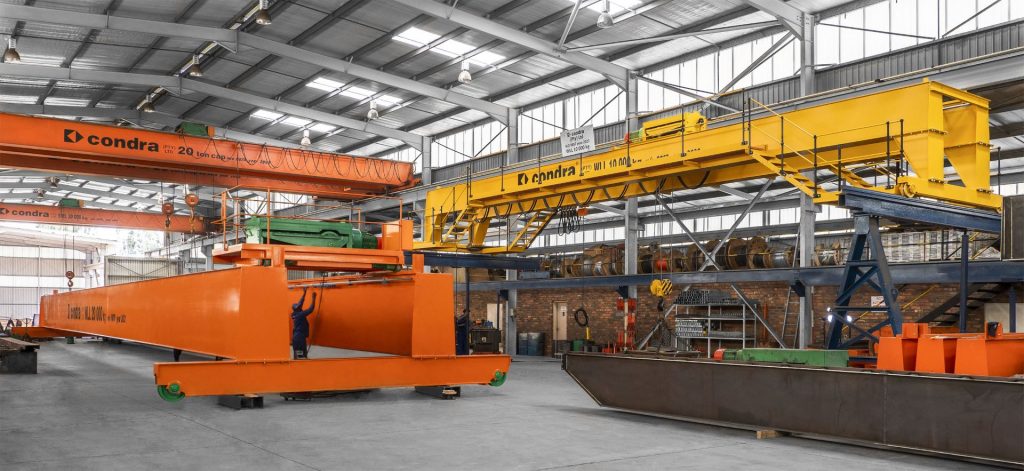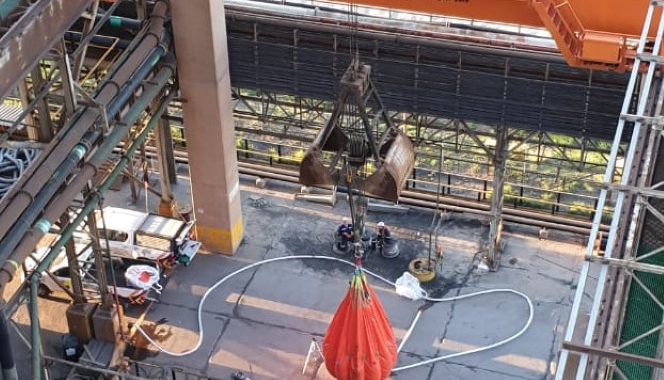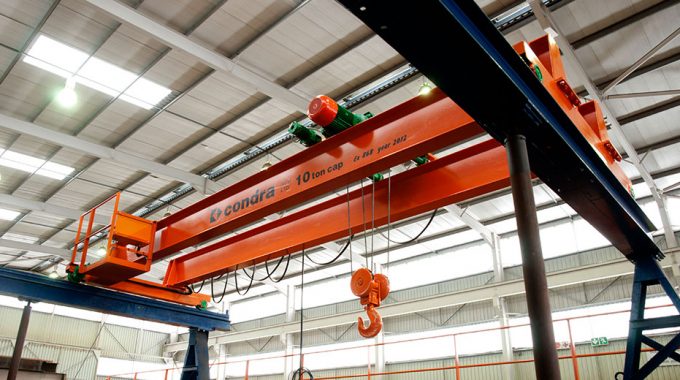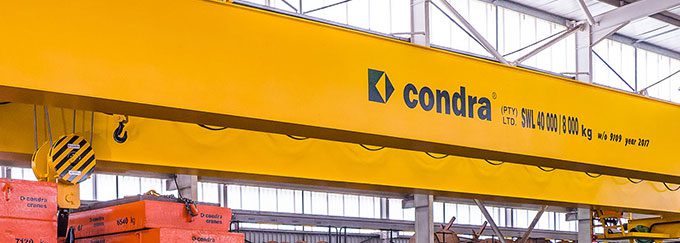STEEL SHORTAGE A BONANZA FOR SOME
South Africa’s current steel shortage is compounding an already serious obstacle to the efficient functioning of the subcontinent’s overhead crane market: declining service footprints.
Currently, only Condra has both the capability to manufacture and enough steel with which to do it. By contrast, other manufacturers are suffering material shortages exacerbated by a declining capability in terms of geographic reach, further lengthening lead times for this type of machinery.
Condra’s order book is benefiting, with the company continuing on time execution of orders at its factories in Johannesburg and Cape Town.
Typical of these is one for a wide-span overhead crane secured by Cape Town subsidiary BB Cranes working in close cooperation with structural steel company Vlottenburg Engineering.
The customer, Dolphin Offshore Chandling, has placed an order on Vlottenburg Engineering for a new maintenance workshop in the Angolan port of Luanda.
Condra’s crane for this workshop will be an overhead electric overhead travelling machine with a span of almost 30 metres, allowing the full floor area to be serviced. The crane will work to maintain equipment brought in by Dolphin from oil exploration vessels and offshore oil and gas extraction platforms.

During the tender phase of the contract, Condra proposed that the crane lifting height be maximised to 9,1 metres – almost the full height of the workshop walls – by designing girders with angled ends to match the slope of the workshop roof. Such a design allows the crane to be mounted with much of the machine’s volume occupying unused space within the roof itself.
Crane capacity will be 10 tons. There will be variable speed drives on the hoist and the long- and cross-travels, and control will be by pendant.
Besides their angled ends, the 28,7-metre long twin girders have been designed with splices to comply with regulatory restrictions on the road between Johannesburg and Luanda, where load lengths cannot exceed 18 metres because of curves.
Splice designs have become a common feature among Condra’s export orders. For the Dolphin Offshore Chandling crane, steel plates welded eccentrically to the four inside faces of the male box girder will result in a friction grip to reinforce girder strength and integrity beyond that delivered by the splice bolts alone. An internal box insert traversing the splice will deliver additional strength and rigidity, resulting in an almost seamless splice with a projected girder life in excess of 20 years.
Even though BB Cranes secured the Dolphin Offshore Chandling contract from Cape Town, Condra is executing manufacture at its Johannesburg works to reduce shipping costs.
The order was placed in mid-August for delivery end November.
Commenting on South Africa’s current steel shortage, Condra’s managing director Marc Kleiner said that the situation was compounding difficulties in the market.
“Right now, we have an advantage because we have steel stocks, including essential square-bar,” he said. “But the steel supply situation for all manufacturers is likely to ease come November.”
Kleiner cautioned that service footprints beyond South Africa would nevertheless remain a problem for most companies:
“Condra is the only company to increase service levels in central and southern Africa. Other participants are hindered because their manufacturing and staff levels have been negatively affected by the overall economic climate.”
In recent months, Condra has captured an increasing share of the sub-Saharan market for cranes and hoists, with notable recent orders from Cameroon, DRC, Angola, Botswana and Mozambique.
The company’s product lines of cranes, hoists and component sub-assemblies continue to enjoy a reputation for lowest overall lifetime cost under harsh operating conditions.
Currently, only Condra has both the capability to manufacture and enough steel with which to do it. By contrast, other manufacturers are suffering material shortages exacerbated by a declining capability in terms of geographic reach, further lengthening lead times for this type of machinery.
Condra’s order book is benefiting, with the company continuing on time execution of orders at its factories in Johannesburg and Cape Town.
Typical of these is one for a wide-span overhead crane secured by Cape Town subsidiary BB Cranes working in close cooperation with structural steel company Vlottenburg Engineering.
The customer, Dolphin Offshore Chandling, has placed an order on Vlottenburg Engineering for a new maintenance workshop in the Angolan port of Luanda.
Condra’s crane for this workshop will be an overhead electric overhead travelling machine with a span of almost 30 metres, allowing the full floor area to be serviced. The crane will work to maintain equipment brought in by Dolphin from oil exploration vessels and offshore oil and gas extraction platforms.

Busy factory floor – Condra’s Johannesburg factory reflects the company’s
healthy order book, with two cranes under manufacture and a third (yellow machine) under test
During the tender phase of the contract, Condra proposed that the crane lifting height be maximised to 9,1 metres – almost the full height of the workshop walls – by designing girders with angled ends to match the slope of the workshop roof. Such a design allows the crane to be mounted with much of the machine’s volume occupying unused space within the roof itself.
Crane capacity will be 10 tons. There will be variable speed drives on the hoist and the long- and cross-travels, and control will be by pendant.
Besides their angled ends, the 28,7-metre long twin girders have been designed with splices to comply with regulatory restrictions on the road between Johannesburg and Luanda, where load lengths cannot exceed 18 metres because of curves.
Splice designs have become a common feature among Condra’s export orders. For the Dolphin Offshore Chandling crane, steel plates welded eccentrically to the four inside faces of the male box girder will result in a friction grip to reinforce girder strength and integrity beyond that delivered by the splice bolts alone. An internal box insert traversing the splice will deliver additional strength and rigidity, resulting in an almost seamless splice with a projected girder life in excess of 20 years.
Even though BB Cranes secured the Dolphin Offshore Chandling contract from Cape Town, Condra is executing manufacture at its Johannesburg works to reduce shipping costs.
The order was placed in mid-August for delivery end November.
Commenting on South Africa’s current steel shortage, Condra’s managing director Marc Kleiner said that the situation was compounding difficulties in the market.
“Right now, we have an advantage because we have steel stocks, including essential square-bar,” he said. “But the steel supply situation for all manufacturers is likely to ease come November.”
Kleiner cautioned that service footprints beyond South Africa would nevertheless remain a problem for most companies:
“Condra is the only company to increase service levels in central and southern Africa. Other participants are hindered because their manufacturing and staff levels have been negatively affected by the overall economic climate.”
In recent months, Condra has captured an increasing share of the sub-Saharan market for cranes and hoists, with notable recent orders from Cameroon, DRC, Angola, Botswana and Mozambique.
The company’s product lines of cranes, hoists and component sub-assemblies continue to enjoy a reputation for lowest overall lifetime cost under harsh operating conditions.


